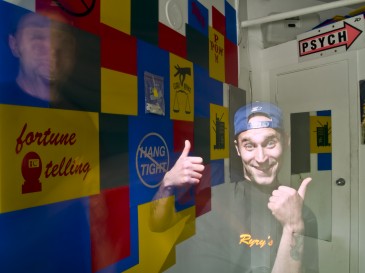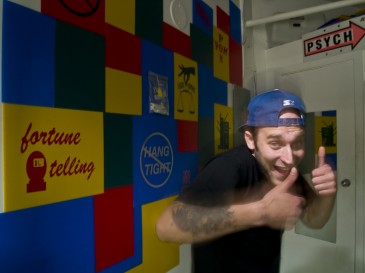
Long condemned by negative connotations, today the words “warbled” and “scratched” turn and wind with a certain charm. No longer deviants and escapees from the guards of clean recorded sound, the acquired qualities of aging music mediums find new hope in listeners as endearing characteristics. Vinyl records have been tremendously re-popularized. Praised for their analogue sound and audio warmth, they are also applauded for being first on the home-listening scene.
But are records an anomaly? What about those funny plastic rectangles that survived into the ‘90s? The cassette tape, it would appear, is also making a comeback. Fifty cents at Salvation Army, one dollar at Value Village and five bucks on the merch tables of up-and-coming bands, cassettes are suddenly something to reconsider collecting. With growing demand for this music medium comes significant space for creativity.
Vancouverite Ryan Smith’s Green Burrito Records is what that creativity sounds like.
Arriving in Gastown at 8 Cordova Street, I find myself at a small, colourful bodega. The front window is splashed with comical signage advertising WiFi, Hot Coffee, White-Tees, Live Bait, Fortune Telling, Cheezies, and Legal Advice. Provided generously by local art supporter Scott Hawthorn, this nameless corner store is Smith’s own business-shaped art installation. Decorated by his creativity until July 15, the bodega currently stands adorned by a handful of Green Burrito produced cassettes, while a mixed tape sings in the background. Inside, Smith sets up for the day. With a variety of merchandise as random as the window advertising, Smith sits contently as shopkeeper, but only one topic of conversation seems appropriate: cassettes.
Smith loves them, and his fondness for them inspired him to launch a cassette label. Well, not an actual label, because the bands are unsigned, but a cassette production company called Green Burrito Records. Begun in 2010, he has produced cassettes for 12 Vancouver bands to date, including Johnny de Courcy, the Courtneys, Mac DeMarco, Weed and Two Towns.
“It was the love of home recording and the simple quality of making mixed tapes,” Smith says, which proved his compatibility with cassettes. This realization combined with his experience touring with Makeout Videotape and his discovery of tape duplication solidified Green Burrito Records as an official project for Smith. And when he found himself holding Green Burrito’s share of his first 50-cassette release for Capitol 6, he liked the way it felt.
Growing up in the time when tapes and CDs overlapped, Smith’s relationship with cassettes owes little to nostalgia. Like so many twenty-somethings, the allure of cassettes isn’t about reliving fading memories, but about having new ones in a fading context.
“The era of the cassette was super kick ass and then it disappeared,” Smith says. “Tons of good music was put on cassette first. That’s why you can find so many good albums on cassette.” Its is how an era of music was supposed to be heard. I ask Smith what it is that he loves about the sound of cassettes.
“There’s the analog hiss and, well, [that] is the big thing. You can just hear the hiss and it’s got some cracks and warbles.” These characteristics produce, “a certain quality” that have charmed him.
But as times change, reproducing the past becomes an act of incorporating the present. Smith records music from digital form, into the tape deck and then records that music onto a new cassette. That’s his standard production method and it’s certainly not the way things were done 30 years ago.
“That’s just a sign of the times.” Aware it’s 2012, Smith continues, “It’s just like the white iPod headphone is the perfect headphone to test the music, in my mind. If it sounds good there, it will sound good played anywhere.” So both the recording and sound quality testing on Green Burrito Records are indebted to a digital era, but as long as the product is physical, Smith has no complaints.

Indeed, as much as Smith is pleased that new music is more accessible through sites like Bandcamp and Sound Cloud, he says music “should be heard live at a show or on a physical format.” Though empathetic, his thoughts on digital music remain that “it will never hold anything stronger than a record or a tape or a CD, or anything physical for that matter.” This motivates Smith to find good music a home on hard copy.
So with permanence in mind, Smith continues making cassettes for local artists. After his first trial run of 50 cassettes, Smith upgraded, “100 was a good number to me. Not too little, not too much.” With 50 tapes given to the band and 50 tapes kept by Smith, Green Burrito cassette production does not mean mass production. The goal isn’t to make 500 cassettes and have 300 sit somewhere, it’s to distribute music on a realistic scale. So despite the fact that almost all his releases have sold out, Smith doesn’t expect to get rich with Green Burrito. “I’m not trying to make any money, just trying to jam out, have a good time,” he says.
That said, despite having made over 1,200 cassettes last year, Smith has no delusions about the popularity of his products. Though a growing niche among young people in the city, generally, “people don’t like them that much.” Their sound quality may be defective, but Smith isn’t too concerned about battling the subjective. With Green Burrito, his time is reserved “to have fun, make music and not think about it too much.”
Rich in debt, friendship, and great tunes, Ryan smiles and laughs. “Just let the good times roll.”


